第14章 THE VOTER AND THE TWO VOICES(2)
Nearly all the great newspapers,both pompous and frivolous,will declare dogmatically day after day,until every one half believes it,that red and green are the only two colours in the paint-box.THE OBSERVER will say:"No one who knows the solid framework of politics or the emphatic first principles of an Imperial people can suppose for a moment that there is any possible compromise to be made in such a matter;we must either fulfil our manifest racial destiny and crown the edifice of ages with the august figure of a Green Premier,or we must abandon our heritage,break our promise to the Empire,fling ourselves into final anarchy,and allow the flaming and demoniac image of a Red Premier to hover over our dissolution and our doom."The DAILY MAIL would say:
"There is no halfway house in this matter;it must be green or red.We wish to see every honest Englishman one colour or the other."And then some funny man in the popular Press would star the sentence with a pun,and say that the DAILY MAIL liked its readers to be green and its paper to be read.But no one would even dare to whisper that there is such a thing as yellow.
For the purposes of pure logic it is clearer to argue with silly examples than with sensible ones:because silly examples are simple.But I could give many grave and concrete cases of the kind of thing to which I refer.
In the later part of the Boer War both parties perpetually insisted in every speech and pamphlet that annexation was inevitable and that it was only a question whether Liberals or Tories should do it.It was not inevitable in the least;it would have been perfectly easy to make peace with the Boers as Christian nations commonly make peace with their conquered enemies.Personally I think that it would have been better for us in the most selfish sense,better for our pocket and prestige,if we had never effected the annexation at all;but that is a matter of opinion.
What is plain is that it was not inevitable;it was not,as was said,the only possible course;there were plenty of other courses;there were plenty of other colours in the box.Again,in the discussion about Socialism,it is repeatedly rubbed into the public mind that we must choose between Socialism and some horrible thing that they call Individualism.I don't know what it means,but it seems to mean that anybody who happens to pull out a plum is to adopt the moral philosophy of the young Horner--and say what a good boy he is for helping himself.
It is calmly assumed that the only two possible types of society are a Collectivist type of society and the present society that exists at this moment and is rather like an animated muck-heap.It is quite unnecessary to say that I should prefer Socialism to the present state of things.Ishould prefer anarchism to the present state of things.But it is simply not the fact that Collectivism is the only other scheme for a more equal order.A Collectivist has a perfect right to think it the only sound scheme;but it is not the only plausible or possible scheme.We might have peasant proprietorship;we might have the compromise of Henry George;we might have a number of tiny communes;we might have co-operation;we might have Anarchist Communism;we might have a hundred things.I am not saying that any of these are right,though I cannot imagine that any of them could be worse than the present social madhouse,with its top-heavy rich and its tortured poor;but I say that it is an evidence of the stiff and narrow alternative offered to the civic mind,that the civic mind is not,generally speaking,conscious of these other possibilities.The civic mind is not free or alert enough to feel how much it has the world before it.There are at least ten solutions of the Education question,and no one knows which Englishmen really want.For Englishmen are only allowed to vote about the two which are at that moment offered by the Premier and the Leader of the Opposition.There are ten solutions of the drink question;and no one knows which the democracy wants;for the democracy is only allowed to fight about one Licensing Bill at a time.
So that the situation comes to this:The democracy has a right to answer questions,but it has no right to ask them.It is still the political aristocracy that asks the questions.And we shall not be unreasonably cynical if we suppose that the political aristocracy will always be rather careful what questions it asks.And if the dangerous comfort and self-flattery of modern England continues much longer there will be less democratic value in an English election than in a Roman saturnalia of slaves.For the powerful class will choose two courses of action,both of them safe for itself,and then give the democracy the gratification of taking one course or the other.The lord will take two things so much alike that he would not mind choosing from them blindfold--and then for a great jest he will allow the slaves to choose.